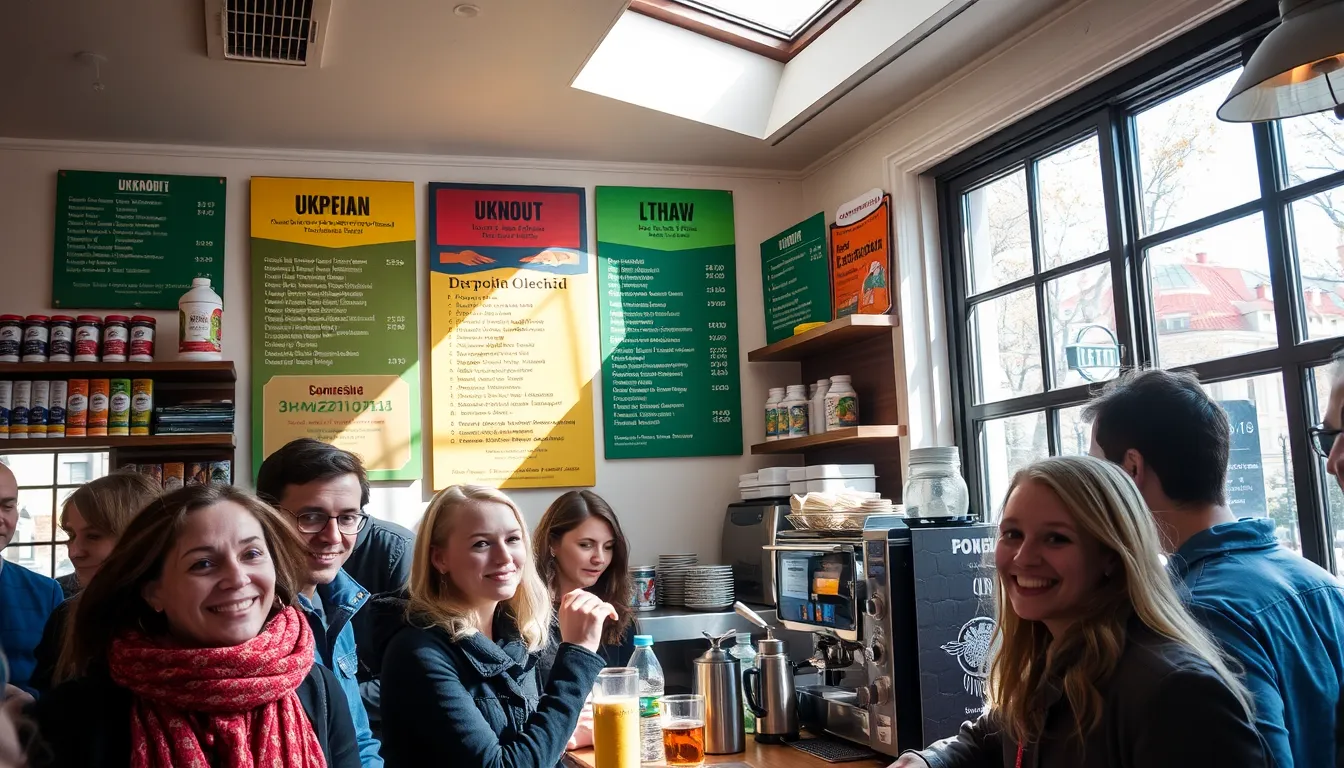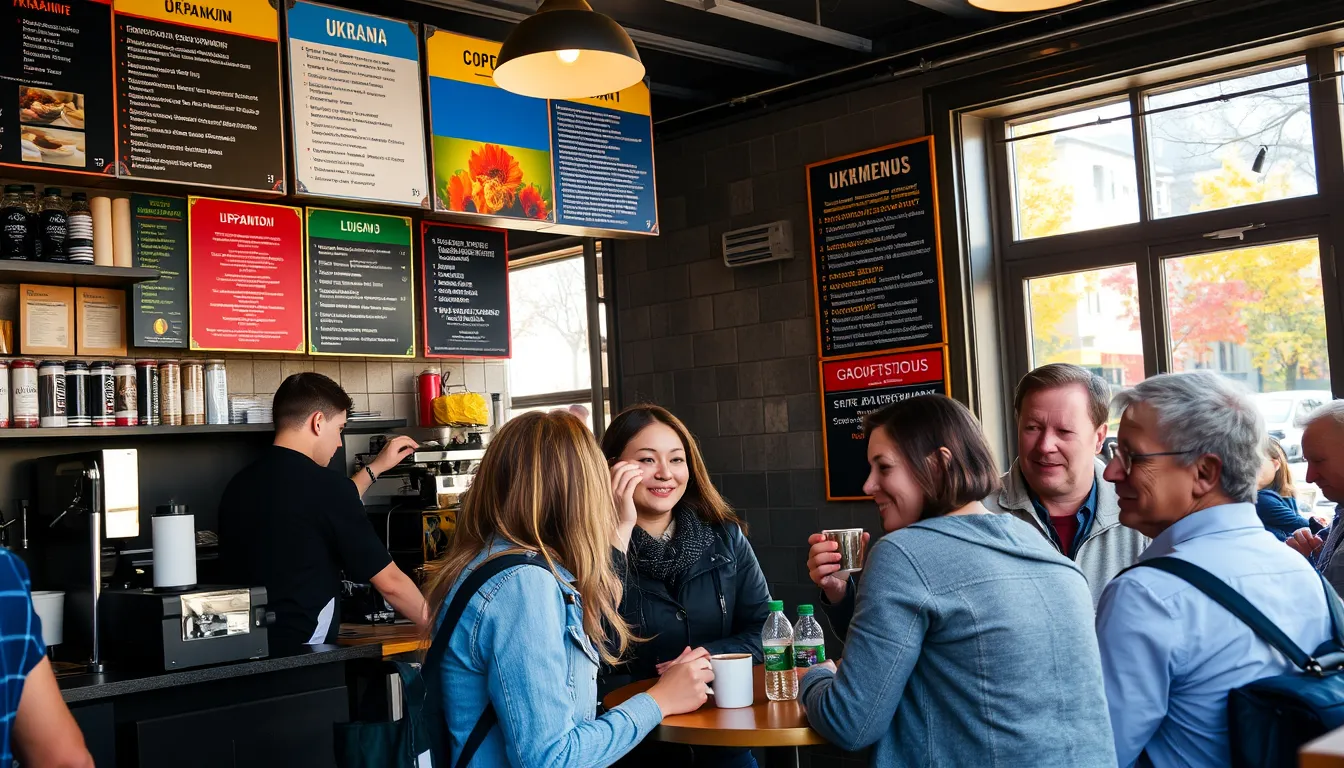Lviv boasts a rich tapestry of linguistic diversity, shaped by its unique history and vibrant cultural scene. The predominant language spoken throughout the city is Ukrainian; however, due to historical influences and the influx of tourists, you will also encounter Russian and Polish as commonly used languages.
The Lviv language, often referred to in the context of its local dialects, exhibits distinct characteristics influenced by the city’s multicultural background. Many residents are bilingual, effortlessly switching between Ukrainian and other languages depending on the context, making Lviv a fascinating place for language enthusiasts.
With its status as a cultural hub, Lviv serves as a meeting point for various linguistic groups. Events such as festivals and educational workshops often encourage multilingual communication, showcasing the city’s commitment to preserving its linguistic heritage while embracing modern influences. Here is a brief overview of the languages most commonly spoken in Lviv:
| Language | Usage |
|---|---|
| Ukrainian | Official language, widely spoken in government, education, and daily life. |
| Russian | Commonly spoken, especially among older generations and in certain neighborhoods. |
| Polish | Used in historical contexts and by the Polish minority; gaining interest among tourists. |
| English | Increasingly understood, particularly by younger people and those in the hospitality sector. |
The diverse linguistic landscape of Lviv not only reflects the city’s historical connections but also enhances its charm for visitors. The blend of languages creates an atmosphere of cultural exchange, allowing travelers to engage with locals in various ways. For instance, many Lvivites enjoy conversing with tourists and are often eager to share their knowledge of the region, regardless of the language used.
As you navigate through Lviv, you might notice the fusion of languages in everyday scenarios, from street signs to menus, which provide windows into the city’s soul. This linguistic diversity allows visitors to have enriching experiences and gain deeper insights into the local culture. Whether you’re ordering a coffee in a cozy café or asking for directions, you’ll find that the ability to communicate, even a little, in the local languages can significantly enhance your Lviv adventure.
Common Phrases in Lviv Language
When visiting Lviv, knowing some common phrases in the local dialect can make your experience even more enjoyable. The Lviv language, while primarily Ukrainian, has its unique flavor, influenced by various historical and cultural layers. Here are some essential phrases that can help you navigate daily interactions and connect with the warm-hearted locals:
- Dobryi den! – Good day!
- Yak spravy? – How are you?
- Dyakuyu! – Thank you!
- Bud’ laska. – Please.
- Proshu prostyty. – Excuse me, I’m sorry.
- Skil’ky ts’ina? – How much does this cost?
- De znakhoditsya [place]? – Where is [place]?
- Ya ne rozumiyu. – I don’t understand.
- Chy mozhete povtority? – Can you repeat?
- Vybachte, ya angliys’koyu. – Sorry, I speak English.
These phrases cover basic greetings, polite expressions, and practical questions, making it easier for you to engage with the locals. Lvivites appreciate when visitors make an effort to speak their language, even if it’s just a few words. This effort can break the ice and lead to delightful exchanges.
Additionally, you may notice some regional expressions unique to Lviv. They often incorporate local humor or cultural references that might not translate directly but reflect the city’s charming personality. Here are a couple of expressions you might hear:
- Vdiag is nozhy! – Literally “get lost,” a playful way locals might use to joke with friends.
- Povny kapets! – An exclamation meaning “full of nonsense,” used in humorous situations.
“Using local dialects is like opening a small window into the soul of Lviv.” – Local resident
Visiting a café or a restaurant? Knowing how to order could greatly enhance your dining experience. Besides the usual menu items, you might encounter some local delicacies. Here are a few words related to food and drink:
- Yabluko – Apple
- Voda – Water
- Holodets – A traditional meat jelly dish
- Pampushky – Ukrainian garlic bread rolls
By integrating these common phrases into your vocabulary, you not only show respect for the local language but also enrich your travel experience. Each successful interaction can lead to deeper connections, stories shared, and a more immersive adventure in the rich cultural landscape of Lviv.
Cultural Significance of Language in Lviv
The Lviv language doesn’t merely serve as a means of communication; it plays a vital role in shaping the city’s cultural identity and reinforcing social bonds among its residents. The way people speak in Lviv mirrors their attitudes, values, and historical experiences, reflecting a deep connection to both their regional roots and their unique heritage.
Language in Lviv acts as a bridge between generations, linking the younger populace with their elders. Many local expressions and idioms carry stories of the city’s past, illustrating how the Lviv language has evolved through time. For instance, references to iconic historical events or notable local figures are often embedded in everyday conversations, enriching interactions with cultural context. This can lead to immersive storytelling experiences that you’ll find captivating.
In Lviv, however, language is not just about words—it’s also about the rhythm and melody of speech. The local dialect has distinctive phonetic qualities that provide a sense of warmth and friendliness. Conversations often flow with a musical quality, perforated by laughter and animated gestures. This liveliness reflects the hospitality of Lviv’s inhabitants, who take great pride in their linguistic heritage. When you stroll through the city, you might notice spontaneous banter among shopkeepers and friendly exchanges in cafés, which help create a nurturing and inclusive environment.
Moreover, the cultural significance of the Lviv language is deeply woven into artistic expressions found throughout the city. From street art to theater performances, the use of local dialects and phrases lends authenticity to Lviv’s creative spheres. Many poets and musicians draw inspiration from their surroundings, celebrating the unique linguistic characteristics of the region. In this way, language becomes a cherished art form, particularly during cultural festivals where local traditions and folklore come alive.
The process of reclaiming and preserving linguistic identity has been vital in fostering connections not just among Lvivites, but also among visitors. The city has embraced the idea that language learning fosters understanding and inclusion. This spirit is evident in various initiatives geared toward promoting local culture through language. Workshops, language exchange programs, and cultural events provide opportunities for locals and tourists to interact meaningfully, enriching their experiences through shared language.
As a visitor, engaging with the Lviv language can open up avenues for deeper connections with the local populace. Whether you’re asking for directions, discussing local music, or sharing a laugh about something unique to the city, your efforts to embrace the language will be warmly welcomed. In Lviv, language is a celebration, a tool for connection, and a gateway to understanding the rich narrative that the city embodies.
Lviv Dialects: Differences and Similarities

Lviv’s linguistic landscape is notably marked by its various dialects, each offering a unique flavor to the spoken word. The city’s dialects reflect a tapestry woven from its historical influences and the cultural interactions among its diverse population. Within this intricate mix, we can identify several key variations of the Lviv language that illuminate the rich character of its residents.
One prominent dialect is the Eastern Galician Ukrainian, which has its roots in the historical region of Galicia. This dialect shares common features with standard Ukrainian, yet it boasts distinctive phonetic traits and vocabulary that set it apart. For example, certain vowel sounds tend to be elongated, lending the speech a melodic quality. Additionally, you’ll often hear unique expressions that may seem unfamiliar to someone who solely speaks standard Ukrainian.
In terms of everyday usage, Lvivites have a penchant for infusing humor into their conversations. The local dialect utilizes playful slang and idiomatic expressions that encapsulate the light-hearted nature of the city’s atmosphere. This engaging style resonates particularly well in informal settings, whether during a lively discussion at a market or a casual chat over coffee.
On the other hand, the dialect spoken by the Polish minority in Lviv is also noteworthy. This variant incorporates Polish phrases and influences, especially in areas with a significant Polish heritage. The intermingling of Ukrainian and Polish in casual dialogue showcases the longstanding relationships between these communities. Observing this mix can provide visitors with delightful insights into the city’s multicultural roots. Here are some examples of how specific phrases might shift based on context:
| Context | Example Phrase (Ukrainian Dialect) | Example Phrase (Polish Influence) |
|---|---|---|
| Greeting a friend | Привіт, друже! (Pryvit, druže!) – Hi, friend! | Cześć, przyjacielu! – Hi, friend! (Polish phrase commonly inserted) |
| Discussing a local dish | Це смачний борщ! (Tse smachnyy borshch!) – This is delicious borscht! | Tego barszcz jest pyszny! – This borscht is delicious! (Polish phrase commonly inserted) |
Moreover, the distinct dialects of Lviv often showcase how locals creatively adapt their speech based on the listener’s background. When conversing with tourists or speakers from other regions, you may notice Lvivites modifying their language to ensure clarity. This adaptability not only reflects the hospitable nature of the people but also illustrates the community’s effort to maintain a connection, transcending linguistic barriers.
Another fascinating aspect of Lviv’s dialects lies in their regional variations, which originate from nearby towns and villages. As you venture out of the city center, you may encounter different pronunciations and vocabulary that further enrich the Lviv language experience. These subtleties can be a delightful surprise for travelers who take the time to explore the broader region.
It is worth noting that understanding these dialectical differences can offer a deeper appreciation for the cultural richness found in Lviv. Each dialect serves as a vessel for history, personal stories, and collective memory, making the act of listening to local conversations an enriching endeavor. Through the lens of dialects, you can witness the vivacity of Lviv’s spirit and the warmth of its people—elements that are essential to the city’s identity.
Language Learning Resources for Visitors
When it comes to immersing yourself in the rich linguistic landscape of Lviv, various resources are available to help you learn and navigate the local language, enhancing your overall experience in this charming city. For visitors interested in picking up the Lviv language, a combination of modern and traditional approaches can aid in your learning journey.
One of the most effective ways to kickstart your language learning is through language schools and courses specifically geared towards foreigners. Many institutions in Lviv offer intensive programs that focus on everyday language use, cultural immersion, and conversational skills. Here are a few options to consider:
- Ukrainian Language School Lviv – This school focuses on providing tailored programs for foreign students, with classes that range from beginner to advanced levels. They also incorporate local cultural elements into their teachings.
- Spoštovany Ukrainian Language Center – Offering engaging courses in a friendly atmosphere, this center emphasizes practical knowledge and cultural insights.
- Lviv Language Academy – Known for its experienced instructors, this academy offers customized lessons, cultural events, and the opportunity to practice with native speakers.
In addition to formal classes, technology plays a significant role in language learning today. Several mobile apps and online platforms are designed to help you learn Ukrainian, specifically tailored to the dialects often heard in Lviv. These resources typically include diverse exercises focusing on vocabulary, grammar, and conversational practice. Some popular language learning apps include:
- DuoLingo – Offers engaging lessons and gamified learning experiences.
- Memrise – Features user-generated content, including phrases and vocabulary used specifically in Lviv.
- Babbel – Provides structured courses that focus on conversational skills and practical phrases.
If you prefer a more immersive experience, consider finding a language exchange partner. Engaging with a local through platforms like ConversationExchange or Tandem can provide invaluable speaking practice while developing a friendship. Lviv’s social scene thrives on interactions, and many locals are passionate about sharing their language in exchange for practicing English. This not only helps build your language skills but also offers insights into the rich cultural tapestry of the city.
For those eager to delve beyond textbooks, Lviv is home to a plethora of social clubs and cultural events where you can practice your language skills in relaxed settings. Coffee shops, bookstores, and cultural centers often host language meetups, workshops, and discussions. Participating in these gatherings allows you to experience the lively spirit of Lviv while honing your communication skills.
Another engaging option is to immerse yourself in the local culture through films and music. Watching Ukrainian movies or listening to local bands can provide context for the language, helping you grasp nuances while being entertained. Radio stations like Radio Lviv broadcast in Ukrainian, which can keep you connected to the language even after your visit.
Before you embark on your language-learning journey, it’s important to set realistic goals and maintain a positive attitude. Embrace the occasional mistakes you might make; they’re an integral part of the learning process and often lead to humorous interactions that locals genuinely cherish. As you practice and engage with the Lviv language, you’ll not only pick up essential skills but also create memorable connections that will enrich your time in this captivating city.
Tips for Communicating Effectively in Lviv
Effective communication in Lviv relies not just on understanding the language itself, but also on grasping the cultural nuances and social etiquettes that shape interactions. Here are several practical tips to help you navigate conversations and enhance your experiences while visiting Lviv:
1. Embrace Bilingualism: Many locals in Lviv are bilingual, often switching between Ukrainian and Russian depending on the context or audience. If you encounter someone who speaks both languages, don’t hesitate to start a conversation in English. Most Lvivites, especially younger generations, can communicate in English, particularly in tourist areas. However, showing that you’ve learned a few phrases in Ukrainian can pave the way for warm exchanges.
2. Be Mindful of Formality: Greeting someone appropriately is crucial in Lviv’s culture. Begin conversations with a friendly “Dobryi den!” (Good day!) or “Privit!” (Hi!). When addressing someone older or in a formal setting, ensure to use polite forms of address. A simple acknowledgment of respect through language can significantly enhance rapport.
3. Use Simple Language: When communicating in any language that isn’t your first, simplicity is key. Stick to basic sentences and clear phrases to avoid misunderstandings. If you find yourself in a situation where you need to ask for help or directions, use straightforward questions like “De znakhoditsya [place]?” (Where is [place]?). This will keep interactions flowing smoothly.
4. Leverage Local Gestures: Non-verbal communication can bridge language gaps effectively. Locals often use gestures, facial expressions, and body language to convey meaning. For instance, nodding or pointing towards locations or items while speaking can help reinforce your message. Don’t hesitate to accompany your words with friendly gestures to enhance understanding.
5. Listen Actively: When engaging in conversations, listening is just as important as speaking. Pay attention not only to the words but also to the emotions and nuances behind them. Active listening can encourage the speaker to elaborate, providing you with a richer context and experience in the conversation.
6. Practice Patience and Positivity: Some language barriers may cause frustration, but patience is essential. If someone doesn’t understand you immediately, calmly rephrase or simplify your statement. Maintaining a positive attitude and a sense of humor can turn a challenging moment into a delightful exchange.
7. Participate in Local Traditions: Engaging in local customs can significantly enhance your interactions. Whether it’s a local festival, a market, or a café, participate actively! Many locals appreciate visitors who are curious about their culture. This can spark conversations that go beyond basic exchanges.
8. Enjoy the Culinary Experience: Food and language often go hand in hand. When ordering food in restaurants, familiarize yourself with some common menu items and expressions to make the experience enjoyable. A simple “Dyakuyu!” (Thank you!) after receiving your meal can create a friendly atmosphere.
9. Explore Language Learning in Social Settings: Engage in casual conversations in bookstores, cafes, or on public transport. Locals will admire your effort to communicate in the Lviv language, making them more likely to help you practice. Consider joining community events or workshops that promote language learning, where you can meet new people and practice in a friendly environment.
By employing these tips, you can navigate conversations more effortlessly and build meaningful connections with the hospitality-rich people of Lviv. Remember, it’s not just about mastering the language, but also about understanding the heart of the conversations that flow within this vibrant city.


